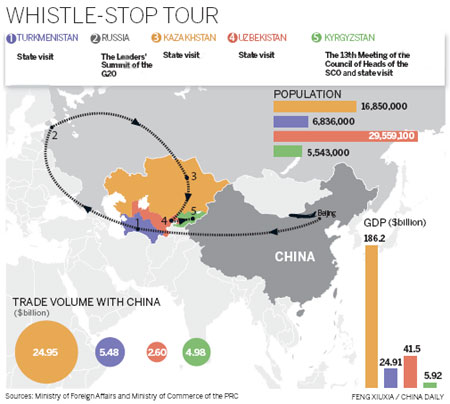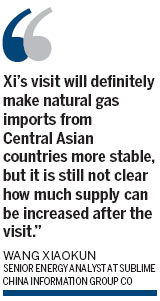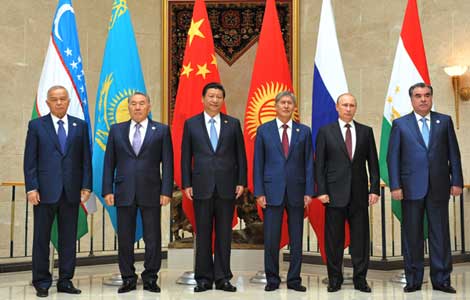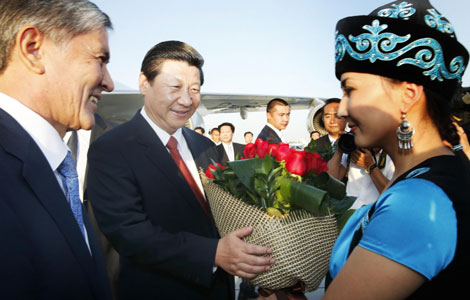
Tour aims to boost energy cooperation
Updated: 2013-09-03 09:33
By Du Juan (China Daily)
|
|||||||||
President to sign agreements for more stable natural gas supply
President Xi Jinping's upcoming tour of four Central Asian nations will further strengthen cooperation in the region, particularly in the energy sector, experts said on Monday.
The president is expected to sign a series of contracts covering oil, natural gas, transportation and investment agreements during his visit, according to Cheng Guoping, vice-minister of foreign affairs.
As a booming economy, it is crucial for China to have diversified energy supplies, and Beijing has been working on the issue in recent years, said Wang Xiaokun, senior energy analyst at Sublime China Information Group Co, a Chinese commodities consultancy.

Between December 2009 and late August this year, China imported 60 billion cubic meters of natural gas from Central Asian countries. The amount is equal to about half of China's total natural gas output in 2010.
The Central Asia gas pipeline is China's first cross-border natural gas pipeline, with an annual delivery capacity of between 30 billion and 40 billion cubic meters.
It is connected to the West-to-East natural gas pipeline inside China, and the clean fuel is provided to about 400 million people in Pearl River Delta and Yangtze River Delta for residential use.
"Xi's visit will definitely make natural gas imports from Central Asian countries more stable, but it is still not clear how much supply can be increased after the visit," said Wang. "The natural gas transmission infrastructure is usually a huge project that could take years."
A more stable natural gas supply is favorable for China when negotiating gas import prices with Russia, she said.
In February, Russia and China confirmed that Beijing will import 38 billion cubic meters of natural gas annually from Moscow, a breakthrough since the China-Russia oil pipeline began commercial operation in 2011.
Great benefits
However, the price of imported gas has remained the most disputed topic during the negotiations between the two countries.
Wang said he believes that China's diversified energy import channels will in many ways greatly benefit the country in energy price negotiations.
In addition to imported natural gas from Central Asian countries, the Myanmar-China natural gas pipeline started deliveries in late July after three years of construction.

According to China National Petroleum Corporation, a parallel oil pipeline - expected to start delivering by the end of this year - is almost completed.
The completion of both pipelines will bring 22 million tons of crude oil and 12 billion cubic meters of natural gas into China annually.
At present, natural gas takes up about 5 percent of China's total energy consumption, which means a huge potential of growth because the country is trying to reduce carbon emissions from fossil fuels.
In 2012, China consumed 147.1 billion cubic meters of natural gas, a rise of 13 percent year-on-year.
It imported 42.5 billion cubic meters, a 31.1 percent rise, according to official figures.
The average price of imported natural gas was 2.46 yuan ($0.40) a cubic meter in 2012, according to SCI's data.
During the first half in 2013, the average price of imported natural gas was 2.31 yuan a cubic meter, a decrease of 0.15 yuan compared with the previous year.
Wang said the prices might drop further as China diversifies its import channels.
In the past 20 years, China has established good bilateral ties with Central Asian countries. The large oil and gas reserves in those countries can help China's economic growth, and meanwhile, those countries can also benefit from development opportunities offered by China.
Particularly, as the exploration of Kazakhstan's oilfields continues, the country's oil and gas exports will increase, which is good for China's oil imports, according to a report from CNPC Economics and Technology Research Institute.
The report said Kazakhstan plans to accelerate its downstream business in the oil and gas sector and expand its refineries, which will provide opportunities for foreign investors.
Related Stories
Chinese president to visit central Asian nations 2013-08-26 19:45
Schedule









